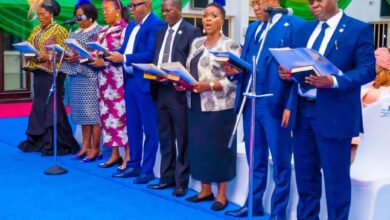Court Halts Financial Allocations To Rivers State Over Budget Irregularities

Justice Joyce Abdulmalik of the Federal High Court in Abuja recently issued a landmark ruling, ordering the Central Bank of Nigeria (CBN) to halt the release of monthly financial allocations to the Rivers State Government. This decision, a significant one in the legal and political landscape, is tied to what the court deemed unconstitutional conduct by the Rivers State government, specifically regarding the 2024 budget presentation.
The ruling came after it was revealed that Governor Siminalayi Fubara presented the 2024 budget before a drastically diminished Rivers House of Assembly, consisting of only four members. In her decision, Justice Abdulmalik declared that this action defied the constitutional mandate requiring legislative approval of state budgets by a fully representative House of Assembly. The judge described the situation as a “constitutional somersault and aberration,” underscoring that the receipt and disbursement of federal allocations by Fubara’s administration violated the fundamental principles of constitutional governance. The court determined that permitting the implementation of a budget passed without the constitutional quorum would undermine the rule of law and set a dangerous precedent.
Justice Abdulmalik emphasized that Governor Fubara’s conduct violated the spirit of the 1999 Constitution, which he swore to uphold. By continuing to implement an unlawfully approved budget, the governor not only disregarded the legislative process but also weakened the very foundation of governance, where transparency, representation, and legality should prevail. This affront to constitutional principles led the court to take the drastic step of restraining key financial entities — including the CBN, the Accountant General of the Federation, Zenith Bank, and Access Bank — from granting Governor Fubara access to funds from both the Consolidated Revenue Fund and the Federation Account. This move aims to prevent further financial operations based on what the court has classified as an illegitimate budget.
The implications of this decision extend far beyond Rivers State, as it highlights the judiciary’s role as a constitutional check on executive actions, especially those that sidestep legislative processes. The ruling underscores the importance of legislative oversight in budgetary matters, establishing a precedent for strict adherence to constitutional norms in the budgeting process. It signals to other state governments the legal risks involved in bypassing constitutional requirements in financial management.
The broader political and social ramifications of this case are likely to resonate across Nigeria. For Rivers State, the halt in federal financial allocations could severely impact ongoing projects, social programs, and employee salaries. This financial restriction, if upheld, will create an urgent need for Governor Fubara’s administration to rectify the budgetary oversight by engaging with a fully representative House of Assembly. Failure to do so could paralyze the state’s financial operations, making this a critical moment for the state’s governance structure.
Furthermore, the ruling serves as a cautionary example of the judiciary’s commitment to safeguarding the constitution. The decision not only enforces the boundaries between the executive and legislative branches but also reminds government officials of the gravity of their constitutional obligations. As other state executives observe the outcome of this case, it may inspire a more rigorous approach to legislative due process, particularly in fiscal governance.
This ruling by Justice Abdulmalik is expected to provoke both legal scrutiny and political debate in the coming weeks, with further developments likely to emerge as more details are made public.



